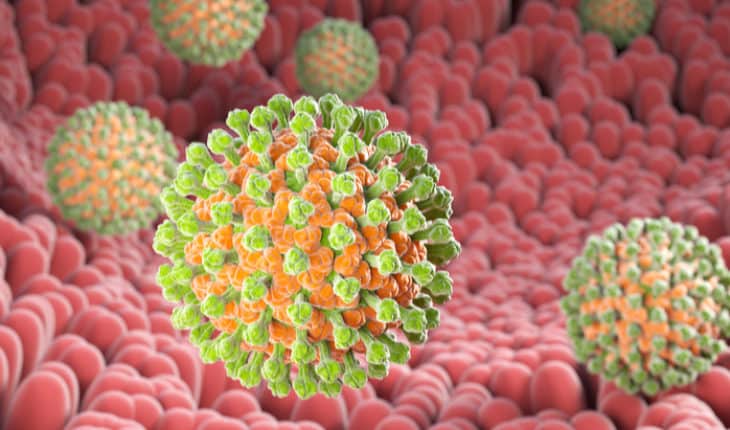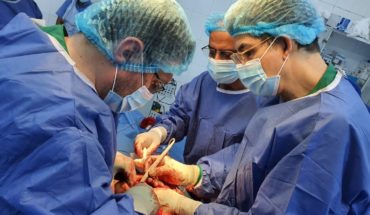Rotavirus vaccines made available for use in humanitarian crises: Health partners welcome landmark pricing agreement through Humanitarian Mechanism, urging more manufacturers to follow suit.
Médecins Sans Frontières (MSF), Save the Children, UNICEF and the World Health Organization (WHO) welcome the opportunity to make rotavirus vaccine available to more children living in humanitarian crises thanks to a landmark pricing agreement with the manufacturer, GSK.
Children living in refugee camps, displaced communities or in other emergency situations now have a better chance of being protected against severe diarrhoeal disease with these lower price rotavirus vaccines. Diarrhoea is one of the leading causes of death among children under five.
The agreement makes use of the multi-partner Humanitarian Mechanism, launched in 2017. Rotavirus vaccine is the second vaccine to be accessed through the scheme, which depends on manufacturers making their vaccines available at their lowest price for use in emergencies – across countries of all income levels. The first to be made available was the pneumococcal vaccine.
“We welcome this engagement from manufacturers and hope it will be a step towards making more vaccines available in the future at affordable prices,” said Dr Kate O’Brien, Director of Immunization, Vaccines and Biologicals at WHO. “It is unacceptable that some of the most at-risk children are not vaccinated against devastating diseases like rotavirus because of lack of availability or high costs.”
Rotavirus is the most common cause of severe diarrhoeal disease in children under 5 years globally, responsible for up to 200,000 child deaths each year. Children in refugee camps and displaced communities are among the most vulnerable in the world to such diseases, due to population density, poor hygiene and sanitation, and higher rates of malnutrition. Vaccination is therefore especially critical for these children, who may otherwise lack access to essential health services.
The Humanitarian Mechanism facilitates access to vaccines for humanitarian organizations working in countries affected by emergencies, where access and prices have otherwise been a bottleneck.
“Every day across the globe, children die because they are critically weakened by diarrhoea – it’s one of the biggest killers of young children in the world. Save the Children is seeing the devastating impacts the rotavirus has on children every day, so we welcome this important commitment as a vital step in protecting some of the most vulnerable children from life-threatening, yet easily preventable diseases. Money should never be a barrier between life and death,” said Rachel Cummings, Director of the Humanitarian Public Health Team at Save the Children.
Since 2017, nearly one million doses of pneumococcal vaccine have been approved for use by civil society organizations through the Mechanism in 12 countries: Algeria, Central African Republic, Chad, Democratic Republic of the Congo, Ethiopia, Greece, Kenya, Lebanon, Niger, Nigeria, South Sudan and Syria. The pneumococcal vaccine protects against childhood pneumonia, also a leading cause of childhood deaths during emergencies.
Once secured through the Mechanism, the vaccines are offered to humanitarian organizations working in camps and other emergency settings, who can make applications to access the vaccine at these lower prices.
“The Humanitarian Mechanism has already expanded the number of children who can receive lifesaving vaccines, but to reach its full potential and save more lives, MSF calls on manufacturers to commit additional vaccines and to allow governments hosting children in humanitarian emergencies to access the vaccines too,” said Miriam Alia, Vaccination and Outbreak Response Referent at MSF. “Children everywhere, no matter where they live, should have access to lifesaving vaccinations.”
“We know that it is critical for us to expand the reach and breadth of immunization coverage among communities affected by humanitarian crises to meet our goal of immunization equity in the next decade,” said Robin Nandy, UNICEF’s Principal Advisor and Chief of Immunizations. “These communities bear the brunt of preventable morbidity and mortality and have disproportionately suffered from programme disruptions as a result of the pandemic. We very much welcome this initiative which further expands access to rotavirus vaccine at affordable prices for populations in need.”
Additional commitments from manufacturers are sought to make more vaccines available through the Mechanism, including typhoid, human papillomavirus and other pneumococcal and rotavirus vaccines.
About
The Humanitarian Mechanism was founded in 2017 through a partnership of UN and civil society organizations – MSF, Save the Children, UNICEF and WHO – to enhance access to vaccines in emergencies by civil society organizations in countries that are not otherwise eligible for Gavi support.
The Humanitarian Mechanism partners invite NGOs and UN agencies working in refugee and IDP camps and emergencies to leverage the Mechanism so they can access the available rotavirus and pneumococcal vaccines.
- Alarming child obesity worldwide forecast for 2050 - 4th March 2025
- World first tech detecting undetectable breast cancer - 3rd March 2025
- Eating disorders: Everything you need to know - 3rd March 2025






